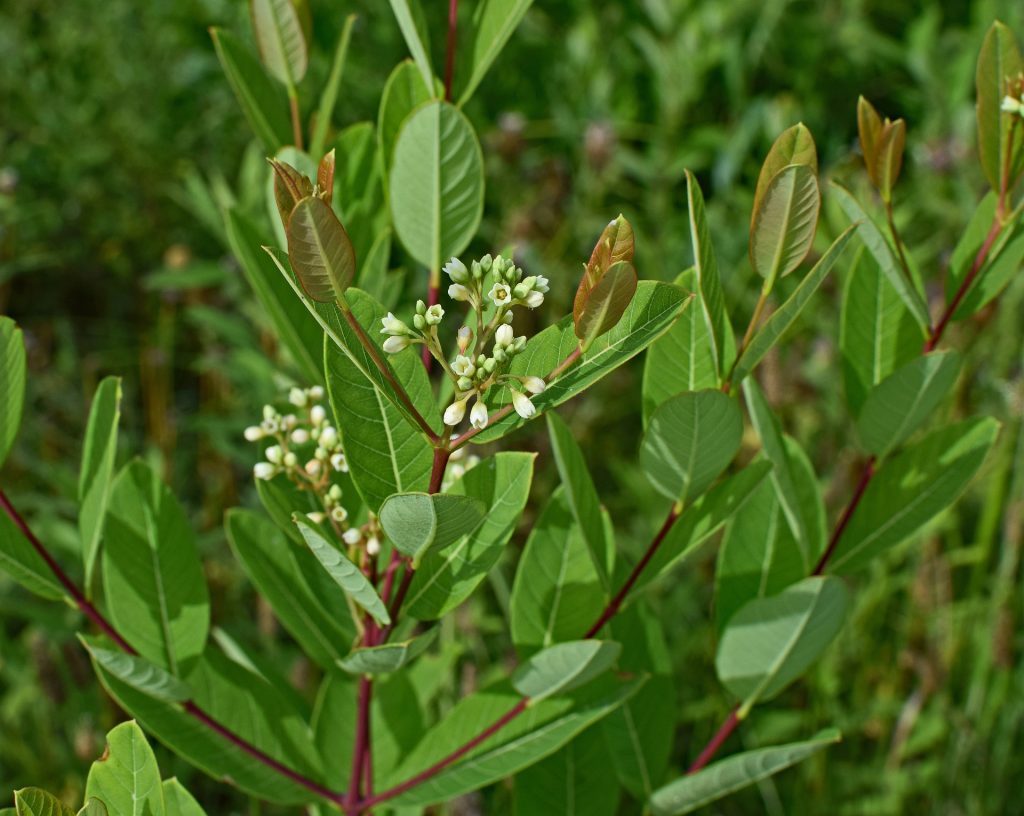 Luobuma is a group of plants belonging to the dogbane family. Luobuma is found growing natively in China. There are a number of species of dogbane, but one of the most notable from a medicinal point of view is Apocynum venetum. Because of its medicinal effects Apocynum venetum is often simply referred to as dogbane or luobuma. Extracts of luobuma are used in Traditional Chinese Medicine, where it is reported to possess calmative and mood elevating properties. In recent years, extracts of dogbane have become popular in Japan, where it is sold as a nutritional supplement. In this regard the leaves of the plant are often used in a decoction and this tea is recommended for both hypertension and for its mood elevating effects. Dogbane therefore shows similar effects to hawthorne in respect to both its cardiovascular and mood elevating effects. The anti-ageing properties of dogbane are also described in Traditional Chinese Medicine and this has been suggested to relate to the high antioxidant content of the plant.
Luobuma is a group of plants belonging to the dogbane family. Luobuma is found growing natively in China. There are a number of species of dogbane, but one of the most notable from a medicinal point of view is Apocynum venetum. Because of its medicinal effects Apocynum venetum is often simply referred to as dogbane or luobuma. Extracts of luobuma are used in Traditional Chinese Medicine, where it is reported to possess calmative and mood elevating properties. In recent years, extracts of dogbane have become popular in Japan, where it is sold as a nutritional supplement. In this regard the leaves of the plant are often used in a decoction and this tea is recommended for both hypertension and for its mood elevating effects. Dogbane therefore shows similar effects to hawthorne in respect to both its cardiovascular and mood elevating effects. The anti-ageing properties of dogbane are also described in Traditional Chinese Medicine and this has been suggested to relate to the high antioxidant content of the plant.

The possibility exists that lubuma is an effective anxiolytic and antidepressant because it works through the same mechanism as benzodiazepine and tricyclic antidepressant drugs. The leaves of luobuma have been investigated for their phytochemical components. It is unclear which phytochemicals are responsible for the medicinal effects of the plant, but extracts of the plant are high in flavonoids, particularly quercetin and kaempferol. Quercetin and kaempferol belong to the flavonol group of flavonoids, and both compounds have been shown to bind to the benzodiazepine receptor in the brains of animals, and here they can exert an anxiolytic effect. Extracts of kaempferol, taken from the leaves of luobuma, have been shown for example to cause anxiolytic effects in mice. Evidence suggests that the mechanism by which kaempferol work is through the benzodiazepine receptor. However, whole extracts also act to increase serotonin level of the brain. The whole extracts may therefore possess other compounds that have additional mood elevating properties compared with isolated kaempferol alone.
The mood elevating effects of luobuma have only been investigated in animal studies. For example, in one study a single treatment of leaf extract from luobuma significantly decreased the anxiety experienced by mice. The authors noted that the effects of the herb were comparable to those of the anxiolytic benzodiazepine drug diazepam. Attenuation of the effects of luobuma were caused by administration of the drug flumazenil. As this drug inhibits the action of benzodiazepine drugs, it is therefore evidence that luobuma may work through the same mechanisms as the benzodiazepine group of drugs. The antidepressant effects of luobuma in rats have also been demonstrated to be similar to that of the tricyclic antidepressant imipramine. Further evidence for the mechanism by which luobuma may work have come through cell culture studies. In this regard, cell culture studies suggest that leaf extracts of luobuma can reduce the excitability of neurons by altering the membrane potential of the cells.
Eat Well, Stay Healthy, Protect Yourself
RdB
